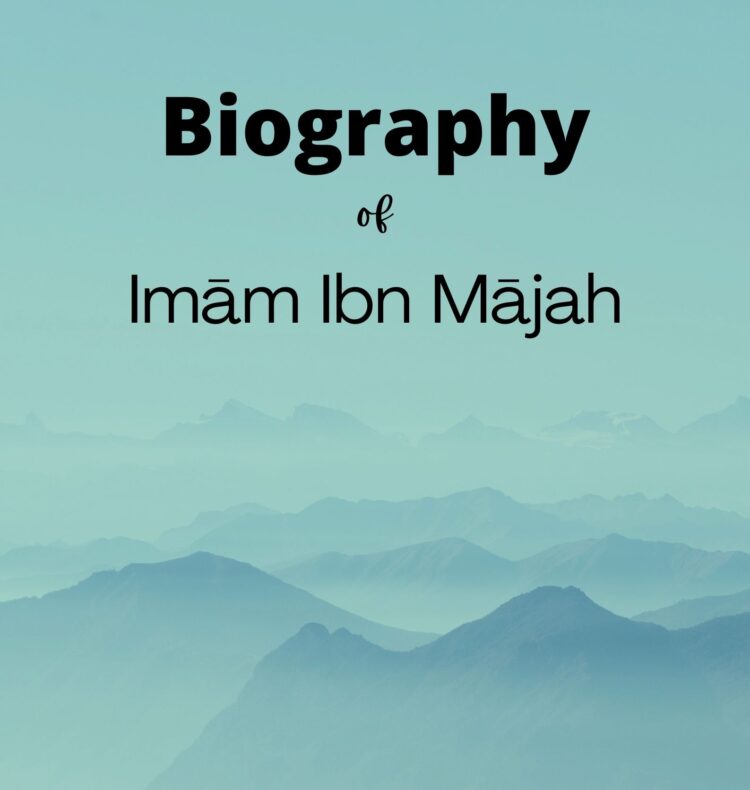Ibn Mājah was an eminent scholar and memorizer of Hadith, and a seeker of truth, like Salman al Farsi. He compiled Sunan ibn Majah and is also amongst the al-Sahih al-Sittah.
His Name, Background and Family
His full name is Abu Abdullah Muhammad ibn Yazid ibn Majah Al-Rabi Al-Qazwini and was born in 209 AH (824 CE) in Qazwin (Qazvin, Iran) in a practicing family of knowledge. His home city was conquered during the Caliphate of Hazrat Uthaman in 24 AH and became a centre of knowledge.
Ibn Majah rose up fond of knowledge, specially the religious sciences. He memorized the Quran and commenced seeking the religious sciences such as Fiqh, Hadith, Tafsir, etc. at an early age. He found in himself a special attachment to Hadith. He applied himself for narrating Hadith and frequented the circles of Hadith Scholars in his home city. He made his first journey for seeking Hadith at the age of 22.
Ibn Majah’s Pursuit of Knowledge
Ibn Majah travelled to plentiful places and learned at the hands of the Scholars of Hadith at his time. He journeyed to Khurasan, Basra, Kufa, Baghdad, Damascus, Makkah, Madina, Egypt, and other places. In each territory he visited, Imam Ibn Majah would remain with its scholars until he acquire their full knowledge.
After arduous journeys that took more than fifteen years, Ibn Majah returned back to his homeland where he was devoted for compilation and dissemination of knowledge. He stayed in his homeland teaching and narrating Hadith to his students. He was frequented by masses of students who came from everywhere to learn at his hands and narrate Hadith from him.
Ibn Majah’s Death
After a lifetime full of learning, teaching and compiling books in Hadith and other religious sciences, Imam Ibn Majah passed away in the 22th of Ramadan, 273 AH (887 CE).
Notable Teachers
- Ibrahim ibn Al-Mundhir Al-Hizami
- Muhammad ibn Abdullah ibn Numayr
- Harmalah ibn Yahya
- Al-Hafizh Al-Hilwani Al-Khallal
- Ismail ibn Musa Al-Fazari
- Jabarah ibn Al-Mughallas
- Abdullah ibn Muawiyah
- Hisham ibn Ammar
- Muhammad ibn Rumh
- Dawud ibn Rashid
- Musab ibn Az-Zubairi
- Abu Bakr ibn Abu Shaybah
- Abu Musab Az-Zuhri
Scholars’ Praise of Ibn Majah
Abu Yala Al-Khalili said:
“Scholars are in agreement that Ibn Majah is a great trustworthy scholar whose views are valid for argument. He has full awareness of Hadith and he was an excellent memorizer of hadiths. In addition, he compiled in different branches of knowledge including Sunan, Tafsir (exegesis of the Quran) and history. He was well versed in these areas.”
Al-Hafizh Al-Mizzi said:
“Ibn Majah is a memorizer of Hadith and compiler of ‘As-Sunan’. He had many beneficial writings and numerous scientific journeys.”
Al Hafizh Adh-Dhahabi said:
“Muhammad ibn Yazid (Ibn Majah) is a great memorizer of Hadith and eminent exegete of the Quran. He wrote in Hadith, history and Tafsir. He was the peerless memorizer of Hadith in Qazwin.”
Adh-Dhahabi also said:
“Ibn Majah was a great memorizer and honest critic of Hadith, and his knowledge was so extensive.”
Al-Hafizh ibn Hajar said:
“Ibn Majah was one of the leading scholars, and a memorizer of Hadith. He wrote in Hadith, Tafsir and history.”
Notable Students
- Muhammad As-Saffar
- Ishaq ibn Muhammad
- Sulayman Al-Qazwini
- Ibn Sibawayh
- Ali ibn Ibrahim Al-Qattan
- Ali ibn Said Al-Ghaddani
- Ibrahim ibn Dinar Al-Jarshi
- Ali ibn Ibrahim ibn Salamah
- Jafar ibn Idris
Notable Works
Imam Ibn Majah wrote numerous books topped by his well-known book of Hadith ‘As-Sunan’. This book received high praise from the scholars of Hadith for his special approach and the fact that it included authentic Hadiths not found in the other books of Sunan or the Sahihs of Al-Bukhari and Muslim. He also compiled a great book in Tafsir, as mentioned, in Al-Bidayah wa An-Nihayah, but unfortunately it was lost. He also wrote a book of history that covered the era of the Prophet (S.A.W.) to his time. This book remained long after his demise, as stated by At-Tahir Al-Maqdisi and Ibn Khallikan but it was also lost.
